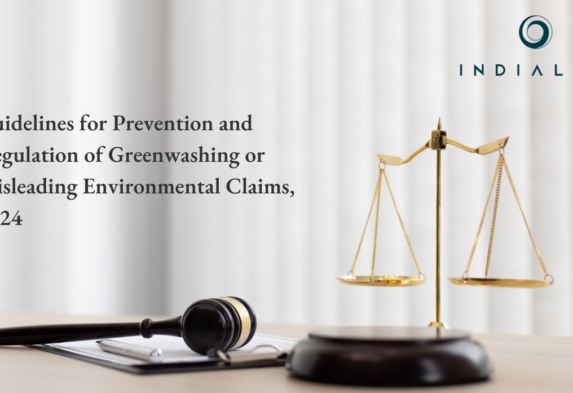Guidelines for Prevention and Regulation of Greenwashing or Misleading Environmental Claims, 2024


The Guidelines for Prevention and Regulation of Greenwashing or Misleading Environmental Claims, 2024 issued by the Central Consumer Protection Authority (CCPA) in furtherance to the Guidelines for Prevention of Misleading Advertisements and Endorsements for Misleading Advertisements, 2022 aim to protect consumers and promote truthful, transparent, and verifiable environmental claims by businesses. Greenwashing—where companies exaggerate or falsely claim environmental benefits of their products or services—misleads consumers and undermines genuine efforts toward sustainability. These guidelines provide a clear regulatory framework to address this issue.
Table of Contents
Definition of “Environmental Claim”
Under the guidelines, an “environmental claim” refers to:
- Any representation, statement, symbol, label, or advertisement that explicitly or implicitly suggests that a product, service, or business operation has environmental benefits, causes less harm to the environment, or meets specific sustainability standards.
- This includes claims related to attributes such as:
- Eco-friendliness (e.g., “environmentally safe,” “green product”).
- Sustainability (e.g., “sustainably sourced,” “carbon-neutral”).
- Resource Efficiency (e.g., “energy-efficient,” “water-saving”).
- Biodegradability or Recyclability (e.g., “biodegradable,” “recyclable packaging”).
- Reduced Emissions or Carbon Footprint (e.g., “low-carbon product,” “zero emissions”).
- Use of renewable resources (e.g., “made with renewable energy” or “from recycled materials”).
- These claims can be made on product packaging, advertisements, corporate reports, or any form of public communication.
The guidelines emphasize that all such claims must:
- Be clear, specific, and unambiguous.
- Be verifiable with reliable, scientific, or technical evidence.
- Avoid the use of vague or unqualified terms unless their meaning is well-defined and supported.
Objectives of the Guidelines
The guidelines aim to achieve the following:
- Ensure Accurate Environmental Claims in advertisements:
- Prevent businesses from making false, exaggerated, or unverifiable claims about the environmental benefits of their products, services, or operations.
- Promote honest communication of environmental credentials to consumers.
- Protect Consumer Rights:
- Safeguard consumers from deceptive marketing practices that lead them to believe they are purchasing environmentally friendly products or services when they are not.
- Empower consumers to make informed decisions based on accurate and reliable information.
- Encourage Sustainability and Accountability:
- Motivate businesses to adopt genuinely sustainable practices rather than relying on misleading marketing.
- Hold companies accountable for the accuracy of their environmental claims through monitoring and enforcement mechanisms.
- Prevent Unfair Trade Practices:
- Eliminate competitive advantages gained through false or misleading environmental advertising.
- Ensure a level playing field for businesses genuinely committed to sustainability.
- Promote Transparency and Verifiability:
- Require that all environmental claims are backed by evidence and verifiable through independent assessments or certifications.
- Encourage businesses to disclose the basis for their claims clearly and transparently.
Key Focus Areas of the Guidelines
- Regulating the use of terms like “eco-friendly,” “sustainable,” “green,” and “biodegradable” to ensure they meet defined criteria.
- Mandating evidence-based certifications for environmental claims.
- Penalizing misleading advertisements and imposing sanctions on violators.
- Encouraging consumer awareness campaigns about greenwashing.
The Guidelines for Prevention and Regulation of Greenwashing or Misleading Environmental Claims, 2024 outline specific penal provisions as defined under The Consumer Protection Act to ensure compliance and deter businesses from making misleading environmental claims.
Conclusion
The Guidelines for Prevention and Regulation of Greenwashing or Misleading Environmental Claims, 2024, are a significant step toward fostering environmental accountability. By defining “environmental claim” and emphasizing verifiability, the guidelines ensure businesses provide clear and reliable information. This protects consumer rights, curbs deceptive practices, and aligns India with global standards for environmental transparency. These measures are essential for promoting genuine sustainability and empowering consumers to contribute to a greener economy.
For further details write to contact@indialaw.in




